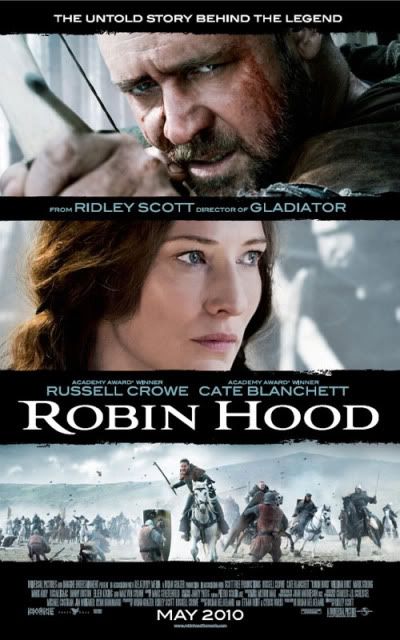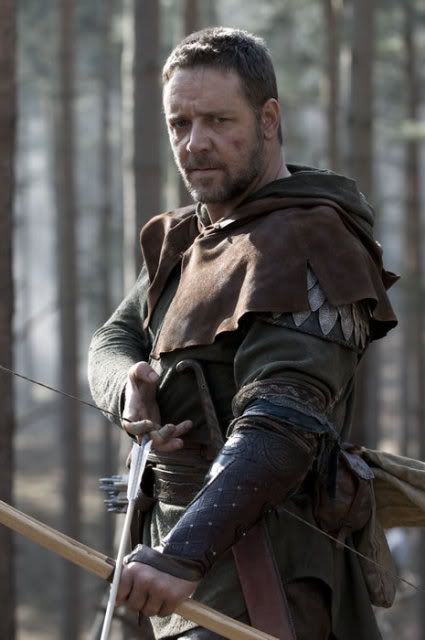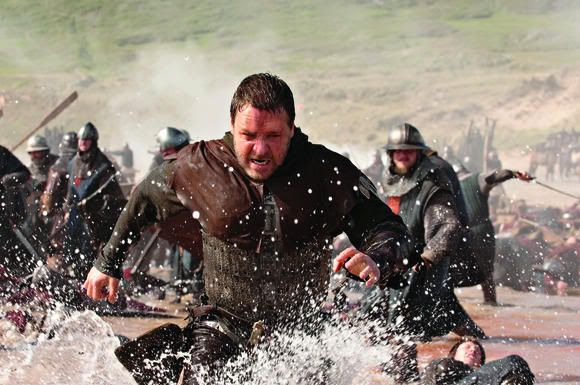
May 26, 2010
Robin Hood (2010)
Should I see it?
Nope.
Short Review: Russell Crowe goes from Maximus to Minimus.

Ridley Scott is a hit or miss guy. When he hits, he tends to knock it out of the park (Alien, Gladiator, Blade Runner). When he misses he lets go of the bat mid-swing and sends it helicoptering into the stands (Legend, G.I. Jane, Hannibal). In this instance, you want to make sure you're ready to duck.
Scott attempts to display “the real” Robin Hood by dispensing with all of that entertaining legend nonsense. This is as sensible as making Star Wars focusing on Luke Skywalker before the droids drop from the sky. The whole point of going to see a Robin Hood movie is to actually see ROBIN HOOD. Perhaps I’m just stilly that way. Instead of a movie about Robin Hood with his merry men and all of that fun stuff, Scott sticks us with an origin story for a franchise that will never come.
Scott, on one hand, wants to show the real Robin Hood, but then infuses so many ridiculous Hollywood cliché moments into the story that it saps the production of any sense of historical accuracy.
 Robin Longstride (Russell Crowe) rises from common archer (a.k.a. disposable, faceless soldier) to become a consultant to the King of England. This amazing and illogical transformation happens in what is apparently the course of a few weeks.
Robin Longstride (Russell Crowe) rises from common archer (a.k.a. disposable, faceless soldier) to become a consultant to the King of England. This amazing and illogical transformation happens in what is apparently the course of a few weeks.Longstride and his men are lying, philandering grunts who are prone to violence. They steal from corpses, get drunk and fight. Fun guys. Longstrides himself impersonates a dead knight so he can con people out of their money. This plan lands him back in the knight’s hometown of Nottingham where he finds the knight’s wife Marion Loxley (Cate Blanchett) and the knight’s father, Sir Walter Loxley (Max von Sydow a.k.a. Brewmiester Smith).
Sir Loxley is devastated by the news of his son’s death. Well, he’s more troubled by it. Brewmiester Smith turns on an emotional dime and then happily offers to have Longstride pretend to marry Marion in order to retain their property rights. Yes, Loxley learns of his son’s death and in reaction offers the man who stole his son’s clothes a fine meal and tops that off by offering to let him have a run at his son’s widow.
Spoilers abound in the next paragraphs. You have been warned.
This kind of dissonance is littered throughout the movie. Marion survives an attack on Nottingham by French soldiers. During the raid she also dispatches a rapist by stabbing him in the neck with a hidden dagger. Other than this brief moment of sneaky self-defense, she offers no recognizable skill at arms.
Since she is a woman and Scott is an adherent to 1970’s feminism, Marion being a woman isn’t enough. She isn’t a real woman until she transforms into a man with birthing hips. This translates to Marion arriving at the climactic battle sequence dressed in full battle armor surrounded by orphans riding ponies. Yes, you read that correctly.
Does Scott explain how she could afford a full suit of armor when she’s cried poverty the whole film? Does Scott explain how a thin woman could move in such a heavy suit? Does Scott explain why veteran Medieval soldiers would allow her to enter the field of battle, let alone fight? No on all counts. She’s a manly woman now, and she’s come to kick some butt. It doesn’t matter if it makes sense, its accepted Hollywood sexist pandering.
The rest of the review is free of spoilers.

The previously mentioned contrivances aside, the actors are forced to recite dialog that does little beyond establish basic facts for the situation at hand. There is no deeper meaning to their words nor do they carry any emotional weight.
The thin dialog leads to stumbling character development which in turn gives the actors no footholds to explore their roles. Crowe ends up providing a mush-mouthed version of Maximus from Gladiator and Blanchett turns Maid Marion into Queen Elizabeth with muddy cheeks. If anything, this production may have you pining for their previous work, when they could display their talents in a forum that was worth of their effort.
The film isn’t a complete waste. There are many moments that are enjoyable and contain some worthwhile messages. Longstride is given plenty of lines defining self-determination and human freedom. These messages are lost however in the wandering plot and lose their impact. If you get bored you can look for these small kernels of meaning in this slop of a plot.
I wanted to enjoy the movie but Scott and co. wouldn't let me.

Related Reviews:
Russell Crowe movies
American Gangster (2007)
A Beautiful Mind (2001)
Other Critic's Reviews:
eFilmCritic
Roger Ebert
Click here to buy your copy of
You Are What You See and learn
to change the world from your couch
Labels: Cate Blanchett, film, Max von Sydow, movie review, Ridley Scott, Russell Crowe, Scott Grimes, William Hurt
Share
Previous Posts




Good News Film Reviews LLC 2004-2010 - used with permission
Images, video and titles are the property of their respective copyright holders. Good News Film Reviews LLC claims no ownership or connection to them.
The views expressed on this site are not the opinion of any advertiser or external entity.
While we take care to only link to responsible entities, Good News Film Reviews LLC takes no responsibility for the content linked from this site. There are sharks in the waters. Surf at your own risk.
The Template is generated via PsycHo and is Licensed.





















2 Comments:
I saw the standee for the film about a month ago. It featured "Maid" Marion in armor, which together with Ridley Scott directing told me immediately what kind of movie this was and where it was going. I therefore saved 20 bucks and gave it a miss.
I see I wasn't mistaken.
Solid, straight-on review. You're right about the implausabilities with the Blanchett character. A shame, too, as the actress did an admirable job of lending weight to the role. But showing up at the battle at the end? Like Wendy leading the Lost Boys? Come on. Grrrrrrl-power advocates should be offended by that implausability as much as they should be offended by how her presence at the battle only ends up being standard lady-in-distress fodder for the final hero/villain showdown. I was especially annoyed at her obviously last-minute bit of narration at the end about how they all live together in the wood, no one rich, no one poor ... clearly a last minute bit of pandering to the left and at odds with the rest of the film's "Every Englishman's home is his castle" politics. And what was the motivation for Robin's sudden selflessness, anyway? Childhood trauma? That trauma might explain why he'd become a deserter and thief, but it wouldn't explain his switch to heroism. Just one of those cliches we're supposed to accept without question, I guess.
Post a Comment
<< Home